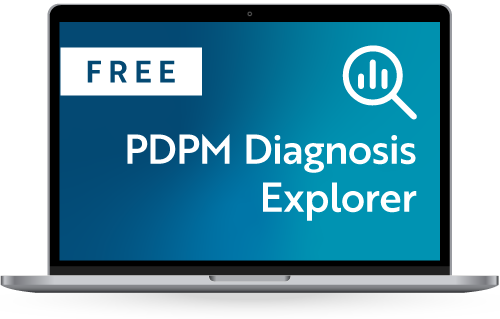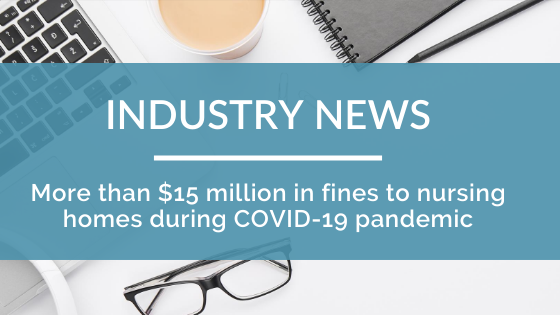Those words were the headlines of a CMS Press Release issued the afternoon of August 14, 2020. The subheading reads: CMS Enforcement Action Against Nursing Homes Triples compared to last year.
Below is a significant excerpt from that Press Release (bolding added by me):
Under the leadership of President Trump, the Centers for Medicare & Medicaid Services (CMS) today announced that the agency has imposed more than $15 million in civil money penalties (CMPs) to more than 3,400 nursing homes during the public health emergency for noncompliance with infection control requirements and the failure to report coronavirus disease 2019 (COVID-19) data. This is part of the Trump Administration’s commitment to safeguarding nursing home residents from the ongoing threat of COVID-19 and holding nursing homes accountable for the health and safety of the residents they serve.
“The Trump Administration is taking aggressive enforcement action against Medicare and Medicaid certified nursing homes that fail to implement proper infection control practices,” said CMS Administrator Seema Verma. “Now more than ever, nursing homes must be vigilant in adhering to federal guidelines related to infection control to prevent the spread of infectious disease, including COVID-19. We will continue to hold nursing homes accountable and work with state and local leaders to protect the vulnerable population residing in America’s nursing homes.”
On March 4, 2020, CMS prioritized its inspection protocols to allow inspectors to focus on the most serious health and safety threats like infectious diseases and abuse. These inspections – also called surveys – are just one of the many tools being used to determine if facilities are safely caring for this vulnerable population. Since March 4, 2020, CMS and the state survey agencies have completed infection control surveys in over 15,276 (99.2 percent) of nursing homes. These surveys have resulted in more than 180 immediate jeopardy level findings for infection control, which is triple the rate of such deficiencies found in 2019. Immediate Jeopardy represents a situation in which a nursing home’s noncompliance with CMS requirements of participation has caused or is likely to cause serious injury, serious harm, serious impairment, or death to a resident. CMS has imposed CMPs for these violations totaling nearly $10 million to nursing homes in 22 states. The average CMP imposed was $55,000.
Early on in the pandemic, CMS and the Centers for Disease Control and Prevention (CDC) developed an unprecedented nationwide reporting system that requires Medicare and Medicaid certified nursing homes to report COVID-19 cases and deaths, among other information, directly to the CDC. The Administration implemented the new reporting requirement to develop a robust federal disease surveillance system to quickly identify problem areas and inform future actions regarding infection control. The majority of nursing homes are reporting data as required. As of August 3, 2020, over 99 percent of facilities are reporting data. However, for those nursing homes that have not reported data or have lapsed, CMS is taking enforcement action. As of August 3, 2020, CMS has also cited more than 3,300 deficiencies and imposed more than $5.5 million in CMPs to nursing homes for failing to report required COVID-19-related data to the CDC.
CMS oversight is intended to ensure nursing homes fulfill their responsibility to provide safe and effective care to their residents. The oversight responsibility of nursing homes is a shared responsibility between CMS and the state. CMS sets standards to participate in Medicare and Medicaid programs and states are responsible for surveys required for licensing nursing homes to operate and for conducting surveys to determine compliance with CMS requirements. CMS has directed states to survey 100 percent of the Medicare and Medicaid certified nursing homes in their state with a focus on infection control protocols to make sure facilities are effectively preventing the spread of COVID-19. The responsibility for ensuring infection control processes and protocols are consistently implemented and maintained ultimately rests with the nursing homes.
Throughout this public health emergency, CMS has taken several actions to protect residents from the ongoing threat of COVID-19. The agency issued more than 18 sets of guidance in the last six months to provide states and nursing homes with ongoing information on proper infection control practices and protocols. By comparison, in all of 2019, CMS issued 9 guidance documents related to nursing homes. On June 1, CMS announced increased enforcement for facilities with persistent infection control violations, including enforcement actions on lower level infection control deficiencies to ensure they are addressed with increased gravity. Nursing homes now face fines up to $5,000 when cited for lower level infection control deficiencies that were identified on a previous survey and up to $20,000 if cited for infection control findings twice or more in the last two years. CMS will continue to take appropriate enforcement actions against facilities that fail to comply with infection control requirements, and use every tool at its disposal to ensure residents are protected during this pandemic.”
This notification comes exactly 24 hours after a Special COVID-19 Nursing Home Call with Seema Verma. In that blog, I provide Administrator Verma’s main talking points including a deep concern because of significant spread, FEMA on high alert to provide supplies, etc. to nursing homes, POC testing being directed to nursing homes, etc. Verma also spoke to the Infection Surveys done prior to July 31, 2020 (more info here), noting that there are significant deficiencies in infection prevention practices with issues seeming to stem from getting IP messages to front-line staff; noting also that these are long-standing practice issues. The most recent posting of Nursing Home Infection Control Surveys (8/6/2020) can be viewed and analyzed.
The Press Release, as always, ends with the reiteration of the “full list of CMS Public Health Actions for Nursing Homes on COVID-19 to date is in the chart below”.
As I blog on this Press Release, I’m also blogging on a survey done by AHCA/NCAL in early August. Here’s a sneak peek at that:
- 55% of nursing homes are operating at a loss right now with nearly 90% reporting a razor thin margin or actual loss and
- 72% of nursing homes stated they won’t be able to sustain operations another year at the current pace (COVID-19 specifically).
The fining and the survey illustrate the crises that the LTC industry is facing on top of the COVID-19 pandemic. F880 has been the most cited deficiency for several years now and obviously will continue with severe financial consequences for many providers. This increased fining is the icing – a blow to an industry that is struggling under the COVID-19 threat. An industry that is, overall, working extremely hard to provide the very best care to their residents. LTC providers do need to increase all efforts to meet the infection prevention and control regulations as well as the PHE guidance from CDC and requirements from CMS. Make sure your Infection Preventionist is on the front lines daily, staff are informed and motivated to follow all infection protocols (including masking, social distancing, etc. when not on duty) to fight and defeat this virus. Ensure your NHSN reports are accurate and timely. Take advantage of all trainings to increase your knowledge of IPCP. Seek help from your QIO and your local/state public health department.
I’m going to quote two widely respected industry leaders – their words are so meaningful. First, Mark Parkinson of AHCA/NCAL:
“We must foster a more collaborative approach to addressing this once-in-a-century, global crisis … Nursing homes cannot beat this pandemic alone and focusing on enforcement and penalties only takes precious resources away at this critical time. Providers need the support of public health officials to prioritize our residents and help facilities acquire the necessary resources.”
Katie Smith Sloan of LeadingAge also made a profound statement on the CMS fining:
“When we know that community spread is a leading source of infection in long-term care, and members are paying tens of thousands of dollars — millions, in some cases — for PPE, tests, and other pandemic-related expenses,” she said. “Fines are not the answer. We need help and collaboration from CMS. A punitive approach is unsustainable.”
From the beginning of the pandemic/PHE, we’ve heard this statement repeatedly: “We’re all in this together”. Actions speak louder than words, don’t they. Both sides (regulators and providers) need to act before it’s too late – for everyone!
Want to keep up with the changing COVID-19 situation in skilled nursing?



